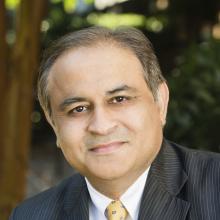As a medical student, do you ever wonder what it’s like to specialize in otolaryngology? Meet Ednan Mushtaq, MD, an otolaryngologist and a featured doctor in the AMA’s “Shadow Me” Specialty Series, which offers advice directly from physicians about life in their specialties. Check out his insights to help determine whether a career in otolaryngology might be a good fit for you.
The AMA Specialty Guide simplifies medical students’ specialty selection process, highlights major specialties, details training information, and provides access to related association information. It is produced by FREIDA™, the AMA Residency & Fellowship Database®.
Learn more with the AMA about the medical specialty of otolaryngology.
“Shadowing” Dr. Ednan Mushtaq
Specialty: Otolaryngology and facial plastic and reconstructive surgery.
Practice setting: Single-specialty group.
Employment type: Private practice in McLean Virginia, and a member of Privia Medical Group, a division of Privia Health. Privia Health is a member of the AMA Health System Program, which provides enterprise solutions to equip leadership, physicians and care teams with resources to help drive the future of medicine.
Years in practice: 28.
A typical day and week in my practice: I work Monday through Friday, usually three days in the office and two days in the operating room. My day begins at 7:30 a.m. and I usually finish by 5 p.m. I complete my patient notes in our EHR usually the same day.
Otolaryngology encompasses several fields. Even though it is a surgical subspecialty, we treat many problems that require chronic medical management, such as allergic and nasal disorders. Our practice has four distinct departments: allergy, general otolaryngology, hearing and balance disorders, and aesthetic and skin care.
In the allergy department, patients are skin tested, or laboratory in-vitro tested for inhalant and food allergies.
General otolaryngology patients present with diverse issues, such as nasal and sinus disorders, sleep disorders, voice or swallowing disorders, head and neck cancer or having had thyroid surgery, as well as pediatric problems, such as ear infections and tonsil problems.
Meanwhile, hearing and balance disorders are complex issues that require both medical and surgical management and hearing aid devices.
The aesthetic and skin care department caters to patients who desire enhancement procedures, including:
- Medical-grade skin care regimen.
- Injectable fillers and muscle relaxers, such as Botox.
- Energy-based procedures, such as radiofrequency microneedling, lasers and intense pulsed light.
- Advanced aesthetic surgeries, such as rhinoplasty, facelift, eyelid lift and forehead lift.
The reconstructive part of the facial plastic practice involves surgical reconstruction of traumatic and post-cancer treatment defects. Procedures are performed both in the office under local anesthesia or IV sedation and in hospital and outpatient surgery center settings.
The most challenging and rewarding aspects of otolaryngology: The most challenging aspect is providing the highest caliber of care while trying to meet patients’ expectations and navigating the roadblocks presented by insurers and other external forces.
The most rewarding aspect is meeting patients’ medical needs and personal expectations.
The impact burnout has on otolaryngology: Physician burnout is present in all specialties. I feel otolaryngologists perhaps suffer less burnout than physicians in other specialties because our field is so diverse in both scientific pursuits and lifestyles, which gives our members opportunities to find a good match for them.
How Privia Health is reducing physician burnout: Our practice is a member of Privia Medical Group, which is an organization that enables private practices to integrate care between primary care and specialty physicians to bill insurers as one large group. This model helps prevent the burnout that physicians at hospitals and large health groups often face because it enables physicians to have autonomy over their practices while being rewarded by insurers for performing high-quality, value-based care.
How my lifestyle matches, or differs from, what I had envisioned: I feel very fortunate to have had a medical career that has been rewarding on both the professional and personal levels. I knew I was going to be a surgeon before I started medical school. I wanted to work hard, but I also wanted to have a family life. I feel otolaryngology and facial plastic and reconstructive surgery have allowed me to fulfill my goals.
It differs in that practicing medicine is about a lot more than providing direct patient care. Physicians face many challenges on a daily basis, such as managing staff, working with their EHR, maintaining their medical education and proficiency, risk management related to patient care and administrative duties, to name a few. Having some knowledge and interest in how to run the business side of your medical practice will help you succeed financially, which will allow you to pursue your professional interests independent of external forces that try to control your practice.
One question physicians in training should ask themselves before pursuing otolaryngology: What field am I truly passionate about and what kind of lifestyle would I like to have as a practicing physician?
I feel every medical student should have an opportunity to observe their field of interest in both an academic or large hospital setting and in a private practice office. Unfortunately, medical practices are being bought by hospitals or large health care institutions. I feel such consolidation may not be the best setting for all fields of medicine.
Exposing each medical student to different types of practices will help them gather the most comprehensive data to inform their choice.
Books, podcasts or other resources every medical student interested in otolaryngology should be reading: My advice would be to pursue topics of interest outside of medicine that you may have had prior to medical school or would like to develop. A physician is a lifetime student—I read medical journals on a regular basis and attend my specialty meetings—as well as take on the role of a teacher who has to educate patients and colleagues.




